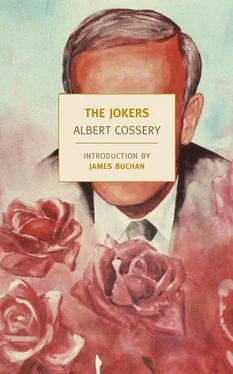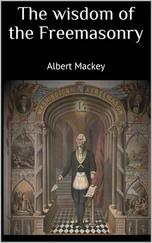Heykal’s arrival in the classroom startled him — as if he were an enemy who had sprung out of the darkness to attack. Heykal was the last person he wanted to see, since he more than anyone couldn’t have cared less about the situation. Heykal’s humor and irony would force Urfy to behave in a way that was incompatible with the torture he was undergoing. He needed calm and solitude. But he overcame his feelings of revulsion at the intrusion, and descended from the podium to greet his guest.
“Welcome,” he said.
“Hello,” Heykal responded. “I’m sorry to disturb you, but I had to see you.”
“You’re not disturbing me at all,” Urfy said quickly. “I was just reading, but I noticed it was getting too dark. Wait here, and I’ll go get a light.”
“Oh, no!” protested Heykal. “It’s fine like this. We don’t need a light.”
Urfy didn’t insist. His visitor’s desire corresponded exactly to his own wish to remain in the dark. What he was most afraid of was that Heykal, with his sharp eye, would discern his distress. He didn’t want to talk about his mother, not at any price, and he didn’t want to discuss the horrible dilemma he faced. This was his own private ordeal, a sacred destiny, and he would hate to see his pain picked over by impious hands. But as soon as he smelled the odor of jasmine emanating from the young man he knew that he wouldn’t escape the thing he feared most. He knew Heykal’s crazy ways. The bouquet was in the inside pocket of his jacket; he was sure to take it out at some point to offer it to the old madwoman. He must be intending to visit her in her room. These meetings between Heykal and his mother terrified Urfy. There was something bizarre, almost insane, about them. It strained his nerves terribly — already he trembled at the prospect.
“Sit down,” he said, indicating one of the benches and taking a seat across the aisle. “I hope it isn’t bad news that brings you.”
“On the contrary. Urfy, my brother, it’s a time to rejoice! The governor is ruined.”
“It’s in the papers?”
“Not yet. But the news came from a reliable source. You can believe me.”
“What happened?”
“It’s very simple. As I predicted, the prime minister demanded his resignation. In a week, we’ll be rid of him.”
Urfy didn’t feel like rejoicing. What did the governor’s ruin matter to him; it couldn’t make up for his own ruin. He could find nothing to say that suggested happiness, or even satisfaction. Everything in him was inert; everything boiled down to suffering. But he mustn’t disappoint Heykal by keeping silent. And yet in spite of his efforts his voice was bitter when he spoke:
“It’s everything you hoped for, isn’t it?”
Heykal seemed not to have heard; his face remained immobile as it slowly disappeared into darkness. By now Urfy could barely make out his features, and he was growing ever more uncomfortable. What if he burst into laughter? He shuddered at the thought. Instantly he knew that Heykal was in an unusual state of mind; something indefinable and vaguely worrisome was going on within him. Urfy leaned across the aisle, reducing the distance that separated him from his friend, presenting his ear, as if in expectation of a whispered message.
“In a sense, yes,” Heykal finally replied.
“What do you mean?”
“I mean, my dear Urfy, that the future may hold some surprises for us. We can’t forget that there are mediocre governors, whose tasteless tyranny wouldn’t give us anything to work with.”
“No doubt,” Urfy said, a bit disconcerted by Heykal’s odd way of thinking. “Leave it to chance then — I suppose it’s served us well so far. We’ve had a lucky streak. We’ve got nothing to complain about.”
“I’m not complaining. But I have a feeling the next governor will bore us to death. He might even try to act sensible — to make people forget the foolishness of his predecessor. He’ll be out to prove himself, that we can be sure of. Perhaps we’ll have to go into exile.”
Urfy had made a superhuman effort to appear interested in Heykal’s premature anxiety about the next governor, and now he began to wonder if Heykal hadn’t perhaps sensed some of his inner turmoil. Why, in any case, was he going on about wanting to leave for other, even more respectable places? Urfy didn’t need to go abroad to find madness and misery. They were flourishing right here in the basement, a daily challenge to his reason. There was plenty for him to get excited about at home, and maybe Heykal envied him for that. He feared the face of his friend, eager to discover the symptoms of this strangely perverse jealousy. But Heykal’s mocking smile, floating in semidarkness, grew suddenly clearer, and Urfy realized that this man, who was incapable of feeling pity, was making fun of him.
The smile disappeared. Heykal asked him:
“How’s your mother? It’s been a long time since I’ve seen her.”
“Still the same.”
“There’s no hope of a turn for the better?”
This was pure nastiness, and Urfy regained his presence of mind. Heykal could only be inquiring for his own benefit. No doubt he dreaded any alteration in the old lady’s condition; he wanted her just as she was, crushed by illness and all for his own pleasure.
Urfy was overcome with a desire to set a trap for Heykal. Maybe at last he’d unmask this solicitude that was more torturous than the vilest indifference.
“I’ve been advised to send her to a clinic,” he said. “But I’m reluctant to do it.”
“Of course.”
“But in the end I’ll probably agree.”
“Don’t!” Heykal cried. Urfy had never seen him so passionate. “Don’t ever leave her, brother! What can you expect from those people? It’s like a death sentence!”
“She needs care that I can’t give her. They use new methods in this clinic. They told me that she might get better.”
“You’re like a child! If they knew how to restore her sanity why wouldn’t they apply their methods to all of humanity! No. Nothing can cure her. They’ll treat her disgustingly — and just for their filthy experiments. She’ll suffer.”
“You don’t think she suffers now?”
“If you really want to know, no — she has no notion of suffering. We’re the ones who see what she is going through; we’re the ones who suffer.”
“What! Heykal, you suffer?”
Heykal reached out to touch the schoolmaster’s arm in a gesture of supplication.
“Don’t abandon her to those brutes! It would be monstrous!”
Heykal fell quiet and turned away. How could he have succumbed to such weakness? Now that the panic passed, now that he was relieved of his fear of never seeing the old madwoman again, of losing her forever, he regretted his words and the passion with which he’d pronounced them. What would Urfy think? He could almost sense the schoolmaster’s stupefied, watchful gaze, while his own face was lost in the heavy darkness of the classroom. All he could see were the letters of the alphabet inscribed on the blackboard, like luminous hieroglyphs. Then, slowly, as if magically commanded by them, he got up, walked down the aisle, and climbed onto the podium, to sit at the schoolmaster’s desk. Far away, below him, he could make out Urfy, a vague mass bent over and caught in the darkness. It seemed as if thousands of years had passed since he’d revealed his secret, and he could look him in the face now, certain of being understood.
The stupor that had overcome Urfy gradually turned into joy. He regained all his confidence, and he wanted to proclaim his delight at the discovery that Heykal was so close to him in his suffering. The ignominious pain was gone now that he knew Heykal, too, was touched by the wound that tore at his soul. And yet as always the other man kept his distance, still imprisoned in his pride. What was he doing up there on the podium, like some forlorn creature stranded on a rock? Why didn’t he come close and take his hand in brotherhood? Urfy attempted to speak but the words stuck in his throat, and it was Heykal’s voice that rang out in the silence.
Читать дальше












